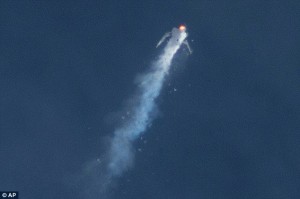By Peter Galuszka
 Does bad news come in twos or threes?
Does bad news come in twos or threes?
First, on Oct. 28, an Orbital Sciences Antares rocket bound to supply the International Space Station exploded seconds into its take off at Wallops Island on the Virginia Eastern Shore.
Three days later, the Virgin Galactic SpaceShipTwo designed for space tourism broke in two during a test flight over the Mojave Desert in California. One pilot was killed and the second was seriously injured when he parachuted to safety.
Both incidents involve private companies pushing ahead to commercialize space which used to be the province of the federal government, NASA and the military. The Orbital incident brought the usual cries that the government should continue its hands off policies about regulating the private space industry. The Virgin Galactic accident changes that equation.
For some background, here’s space.com:
“Thus far, the private space industry has resisted oversight from federal regulators, but that could change in the wake of the accident.
“I suspect there will be pressure for tighter regulations,” (John) Logsdon (of George Washington University) said.
“In 2012, Congress passed a bill that extended the “learning period” for the commercial spaceflight industry. The measure was championed by Congressman Kevin McCarthy, a Republican from California, whose district covers the Mojave spaceport.
“The provision essentially prohibited the U.S. Federal Aviation Administration’s Office of Commercial Space Transportation, dubbed AST, from issuing regulations designed only for the protection of passengers until October 2015. The idea behind this hands-off approach was to allow the spaceflight industry to gain real-world data from their first licensed commercial launches; the FAA would, in turn, use this information to eventually craft regulations.
“In the wake of the accident, Virgin Galactic and the National Transportation Safety Board — the federal agency leading the investigation — have warned against speculation until the ongoing investigation is complete. But critics have made strong claims about risks the company took.
“Tom Bower, a biographer of Branson, told BBC Radio 4 that the accident was “predictable and inevitable.” Joel Glenn Brenner, a former Washington Post reporter who has been following Virgin Galactic’s progress, made similar charges shortly after the accident in an appearance on CNN, adding: “I don’t see them at least being able to carry anybody into space in the next 10 years.
“Andrea Gini, of the Netherlands-based International Association for the Advancement of Space Safety, criticized Virgin Galactic for a lack of transparency about its safety procedures.
“We don’t know how Scaled Composites approached this particular test,” Gini told Space.com in an email. “Virgin Galactic has always refused to participate to the public discussion inside the space safety community, and has never sought the support of independent reviewers.”
“Gini said there are elements of Virgin Galactic’s flight design that experts consider hazardous. The decision to fly passengers and even crew without pressurized space suits, for example, could expose them to risk of decompression, he said.
“Space is, and will always be, a risky industry,” Gini said. “But it is not a new one. I believe that commercial operators should approach it with transparency and humility, or their business, and not just their vehicles, will be doomed to failure.””
That’s sobering. In the Wallops Island case, investigators are loo9king at where decades-old, modified, Russian-made rocket engines that the Russians deemed too dangerous to use were a cause.
There are questions that need answering.


